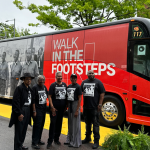Crime Stoppers of Metro Alabama on Monday reversed course hours after announcing that more than $60,000 raised in reward money for information that led to the safe return of Carlee Russell would be returned to donors.
On Monday morning, the organization said they would refund $63,378 donated in the 48-plus hours the 25-year-old nursing student was missing.
However, on Monday afternoon, they announced that was no longer the case.
“This investigation is still ongoing, and accordingly, there is no basis to refund any contributions at this time. Furthermore, the Hoover Police Department has not requested for any donor contributions to be released or refunded,” the afternoon announcement stated.
Russell vanished Thursday after her red Mercedes was seen stopping on Interstate 459 in Hoover as she claimed she saw a male toddler in a diaper on the roadside.
Bob Copus, executive director of Crime Stoppers of Metro Alabama, said Monday morning that some of those donations had already been returned and the rest were in the process of being refunded if that was what the donor requested.
The investigation began shortly after 9:30 p.m. Thursday when Russell called 911 and then called her brother’s girlfriend.
It was during the second conversation that the woman on the other end of the line said she heard Russell scream, and then lost contact with her, hearing only interstate noise.
Police found Russell’s wig, cell phone and purse on the road near her vehicle. Her Apple watch was in her purse.
At 10:44 p.m. Saturday, police said, Hoover 911 received a call from Russell’s family that she had returned home on foot. She was taken by ambulance to UAB Hospital for evaluation and was released about 6 a.m. Sunday.
Russell’s disappearance made headlines across the country and beyond.
In the Birmingham area, police launched an intensive investigation and teams of volunteer searchers spent two days looking for her.
Reward money poured in as well.
Crime Stoppers always offers up to $5,000 for information in cases, but often that reward money is augmented by outside donors, as was the case in Russell’s disappearance.
“It started during the Cupcake McKinney case when people were literally pulling up out front and running in with a shoebox with their change in it,’’ Copus said. “People were giving us $5, $2. Some people were giving us a large sum.”
“At the end of that, we told people, if you would like your money back, you can have it back,’’ he said. “If you would like it to roll over into the reward fund, you can do that too, but it’s your choice.”
In that case, Crime Stoppers created the Cupcake McKinney Fund to be used specifically for child endangerment cases. Copus said $34,000 has been kept in that fund.
“It’s a restricted fund and it can’t be used for anything but those cases,’’ Copus said.
Crime Stoppers then formalized the “augmented fund” for other high-profile cases. There are about 12 active augmented funds right now.
“For large donations, we have an agreement that said you’re giving us this money for this specific case to be used if law enforcement officials deem they’re going to use that money for a payout,’’ Copus said. “If it’s not used or the case is never solved, you can have your money back.”
In the Russell case, the Birmingham Board of Realtors offered $25,000 and an anonymous donor offered $20,000. Their money has already been returned.
The remaining $13,378.58 was pledged by about 60 donors, much of through a PayPal link established by Crime Stoppers to accept donations in the Russell case.
Crime Stoppers today is emailing each of those donors to let them know they can be refunded if that is what they want to happen.
“We would never use a crime as a fundraiser,’’ Copus said.
“This is strictly for the benefit of getting law enforcement the best information as quickly as possible. And also, it allows the public to get involved because they want to get involved.”
“We had donations as large as $25,000 and as small has $5,’’ Copus said. “But every dollar counted because it came from somebody who wanted to see Carlee come home.”
“It really helped the family because it showed the family that people were not forgetting about them,” Copus said.
There was $400 dollars in administrative fees and Crime Stoppers is absorbing that cost with no impact on the donors receiving back exactly what they donated.
“We’re doing it as quicky as we can,’’ Copus said.
Crime Stoppers will pay out on any tip that law enforcement says moved them significantly further along in their investigation.
“It doesn’t have to clear the case, necessarily, all we require is law enforcement saying, ‘This tip made a difference,’’’ Copus said.
Donations to Crime Stoppers are tax deductible.











